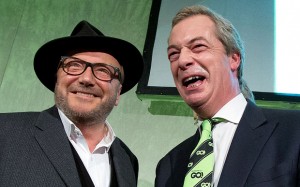Britain’s Leave Debate: Who’s Churchill? Who’s Stalin?

The campaign to Leave is heating up. Take Grassroots Out, a “combined operation” supporting Brexit—the campaign for Great Britain to exit the European Union. G-O fielded a broad spectrum of speakers in London February 19th. Along with UK Independence Party leader Nigel Farage were Conservative Sir William Cash, Labour’s Kate Hoey, economist Ruth Lea, and a London cab driver.
The most unexpected Leave speaker was the far-left former Labour MP and head of the socialist Respect Party. Mr. George Galloway was immediately queried about his new colleagues.
“We are not pals,” Galloway replied. “We are allies in one cause. Like Churchill and Stalin.” He did not say which was which. We report, you decide.
Leave colleagues? Mr. Farage offered Churchillian collegiality. “I don’t suspect there’s a single domestic policy, in many cases foreign policy, of which George Galloway and I would agree. But, look, sometimes in life an issue comes along which is bigger than traditional difference.” (See “The New Happy Warrior.”)
Boris = Lord Randolph?
The Leave campaign received more support February 21st. London’s then-mayor and Churchill biographer Boris Johnson announced he would campaign for Brexit, invoking his admiration for Sir Winston.
Anti-Leave Conservative MP Sir Keith Simpson retorted that Johnson’s decision was “more reminiscent of [Lord] Randolph [Churchill] than Winston. “Randolph was a more extrovert character. [He] made the political weather then catastrophically offered his resignation when he was Chancellor of the Exchequer. [It] was accepted by the then-Prime Minister Lord Salisbury.”
Lord Randolph more extroverted than Winston? YGTBK, as they say on Twitter.
Johnson’s principled decision to support Brexit, defying his prime minister, is far more reminiscent of Winston Churchill’s resignation from the shadow cabinet in 1931. Churchill left over differences on the India Act. That cost Churchill eight years in the political wilderness. This might be Johnson’s fate if Prime Minister Cameron survives the June 23 referendum.
Lord Randolph’s 1886 resignation, by contrast, was thought to be less decisive. He quit over a trivial issue, expecting to be asked back with more power. Lord Salisbury made no such offer, destroying him politically. “Have you ever heard of a man who, having had a carbuncle removed from his neck, asking that it be put back?” Salisbury quipped.
Leave Pied Piper: The True Churchillian
… in this kerfuffle is Mr. Farage—not for representing Churchill’s view of European unity (a complicated subject), but for expressing Churchill’s attitude toward political opponents. (See also: “What Would Winston Do?“)
Mr. Farage invited Mr. Galloway to speak. He introduced Galloway as “one of the greatest orators in this country…a towering figure on the left,” adding that they would work together in the Brexit battle:
On that night, yes, the Respect Party was on the platform, so was the Conservative Party [and the Labour Party]. The point about Grassroots Out is, we’re bringing people together from across the spectrum….[Mr. Galloway] said some very disabling things about me but, look, sometimes…etc.
Farage was displaying Churchill’s famous collegiality—a rare commodity among politicians today. Churchill based this on his belief that everyone in public office deserved respect for serving the country, regardless of how violently he disagreed with their politics.
Churchill and Bevan
Instead of Churchill and Stalin, Mr. Galloway might like to compare Mr. Farage and himself to Churchill and Bevan.
Aneurin Bevan (1897-1960), socialist MP for Ebbw Vale, was a Welsh firebrand with whom Churchill frequently clashed. Bevan would label Churchill a servant of plutocrat oppressors of the workers. Churchill would call Bevan, founder of the National Health Service, “the Minister of Disease.”
Hearing that Bevan had died, Churchill launched into a soliloquy: “A great man, the founder of the National Health Service, a tremendous advocate for socialism and his party….”
Then he paused in mid-sentence. “Er, are you sure he’s dead?”*
_________
* Quotation from Churchill by Himself, 326.






